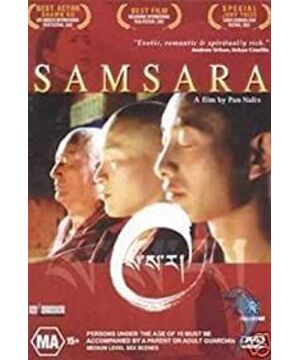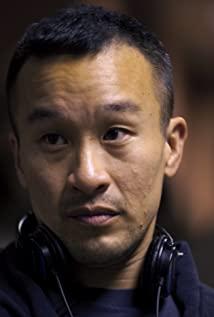"Lust and Caution" is also known as "Samsara", Samsara means reincarnation. When I was a student more than ten years ago, I watched this film for the first time for the title of temptation. I couldn't understand what the film was trying to express. I fast-forwarded and watched the gorgeous scenes in it, and I hung up on the last one. The difficult pose of the rotation is impressive.
After experiencing ups and downs, ups and downs, middle-aged, watching this film again, there is a full harvest.
This is the case with many great works. If the viewer does not have a similar experience, or the experience is not rich enough, it is difficult to achieve empathy, and it is difficult to understand what the creator wants to express.
"Samsara" is such a film.
The story is very simple. In the Himalayas bordering China and India, the monk Da Shi, who had just finished his three-year, three-month and three-day retreat, was greeted by the monks such as the Venerable Living Buddha after leaving the customs. Diligent monks are rare, and the future as a monk is very bright.
Dashi was an excellent monk and a young man at the same time. After leaving the customs, he couldn't control his original desires. At night, he wet the bed sheets with spring dreams. During the day, he saw the breastfeeding women who couldn't move their legs. When he saw the beautiful and intelligent farm girl Pama, his heart ignited, and Pama also loved him. Fang Xinxu. These made him distressed, and also worried his master Apu.
Apu arranged for him to go to a deaf-mute monk, hoping to wake him up by letting him watch pictures that were half erotic and half skeletons, trying to tell him that "desire is the devil", but intellectual realization cannot stop the eruption of desire. Suppressing desire will only make it stronger.
Dashi persuaded his master through the story of Sakyamuni's early secular life. He took off his cassock and entered the world to practice.
After marriage, he found that desire was still tormenting him. He yearned for the beautiful Indian girl who came to help him, and he had an affair with the girl after Pama went out. The girl contributed difficult moves. Later, the news of the master's death came, and Dashi was very sad. The master left him a letter saying, "Is it satisfying a thousand desires, or conquering one desire in my heart?" He suddenly woke up, like Sakyamuni. Quietly left his beloved wife and children and returned to Buddhism.
After re-entering Buddhism, desire was still gnawing at him, and Pama came back to find him, and after criticizing him, he curled up on the ground in pain, his heart like a knife. Pama walks away. Finally, he saw a stone that had appeared before, with the words: "How can a drop of water not dry up?" "To the sea."
The plot looks simple, and the shots are quiet and restrained, which was commented by some netizens as "long and procrastinating". Movies are like the sea, the deeper the meaning, the more slowly it must be told; the calmer the surface, the greater the energy hidden underneath. It reminds me of "Manchester by the Sea", which is also a movie that is calm on the surface but is actually turbulent.
The film "Samsara" is similar to Hesse's novel "Siddhartha". In the novel, Siddhartha is also a seeker, and finally realized the ultimate truth after experiencing all kinds of worldly things. Both works are great, and the images and texts give full play to their respective advantages, and they are both beautiful.
In my opinion, Dashi's experience is a microcosm of the life of the seeker, who pursues the truth but is bound by desire. What is a seeker, who does not want to live a life of ignorance, and pursues the truth and the meaning of life all his life, this is a seeker.
Some people, who have spent their entire lives pursuing desires, live to satisfy desires: earn more money, get higher positions, have more power, eat more delicious food, find more enchanting lovers...they are tireless , sleepless. Taking the ancient emperor as the extreme, after enjoying all the glory and wealth, he was so greedy that he wanted to live forever.
The pursuit and satisfaction of desires bring people happiness, and people also try to fill the emptiness and maintain happiness by satisfying desires. Like the faceless man in Spirited Away, swallowing all kinds of things to fill his empty heart until he turns into a bunch of ugly monsters. But the world is impermanent, there is gain and there is loss, how happy you are when you get it, and how painful it is when you lose it. Even if all desires are satisfied, the end result is not happiness, peace and tranquility, but a great emptiness.
Dashi's last heart-piercing pain is the epitome of all sentient beings' suffering. Desire creates clinging, and clinging to not being able is suffering. All suffering in life comes from grasping and not being able to.
Desire is not useless, the primitive desire of human beings is a powerful driving force for human development and progress. Like other creatures, in order to survive on this planet, human beings can only be guided by instinct, reproduction, reproduction, and become wiser and stronger. This instinct is desire.
People are entangled with desires all their lives. Desires are neither bad nor good. Desires and life are one and the same as life. Master Apu finally asked, "Is it satisfying a thousand desires, or conquering one desire in my heart?" Is it the endless pursuit of desires, or the struggle against desires?
In the film, a game played by Palma and the children is full of Zen and gives answers to questions. The children are by the creek, watching the stream carry the branches forward. In the process, the branches may be overturned by the waves, they may be tripped by stones, they may encounter waterfalls, but eventually they will flow into the sea.
Desire is always there whether you fight it or not; truth is always there whether you pursue it or not.
Another question in the film, "How can a drop of water not dry up?" The answer is "to the sea." How can one escape the cycle of suffering? The answer is not to comply with or fight against desire, but to give up the ego, get rid of the ego, and become one with the universe. I think this is the ultimate meaning that the director wants to express, and it is also the highest realm pursued by those who seek the Way.
Of course, as ordinary people, it is very difficult for us to reach the highest state, and we cannot even uphold the precepts to purify the six sense organs, thereby eradicating desire, but at least we can see desire and clinging when desire arises, and try to do as much as possible. To not be held hostage, not to become a greedy monster.
Go with the flow! Throwing vigorously into the torrent of life, like a drop of water into the sea.
Originally published in my public account "PrajnaRadish"
View more about Samsara reviews










